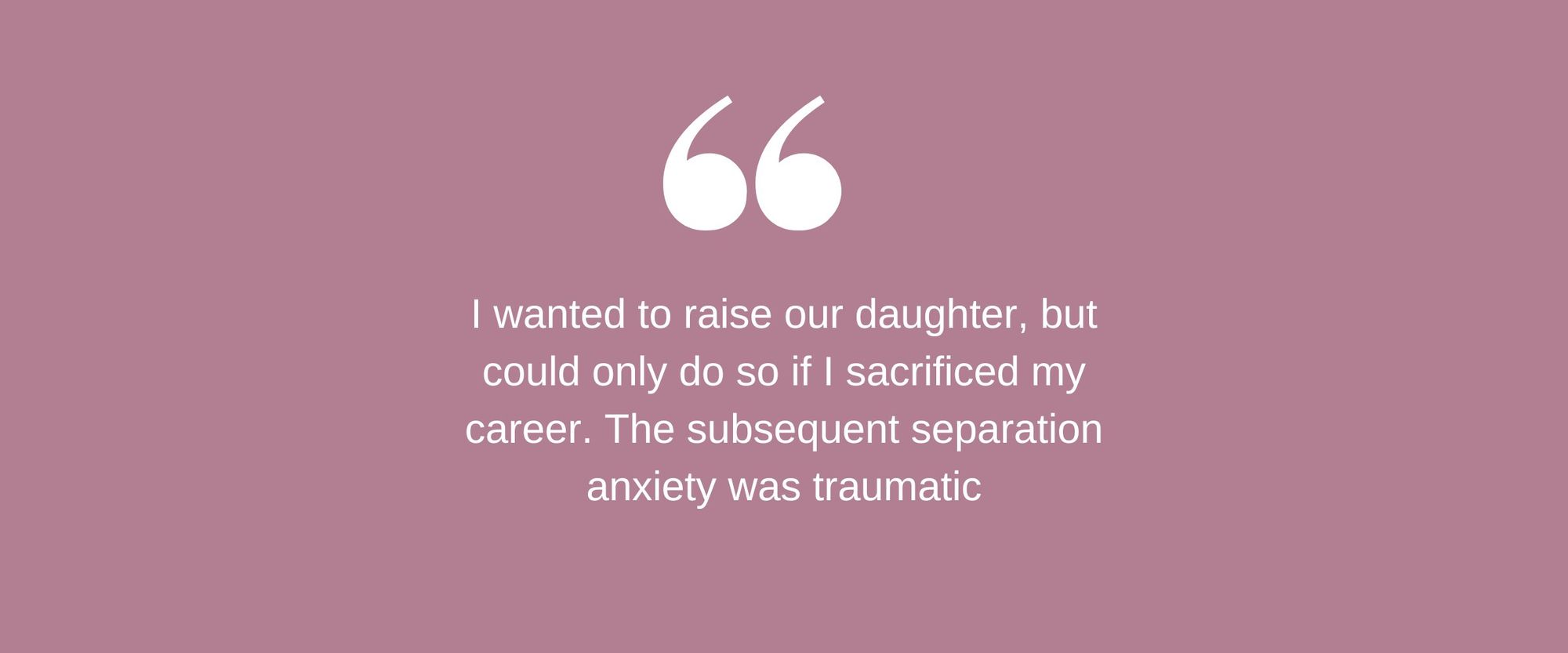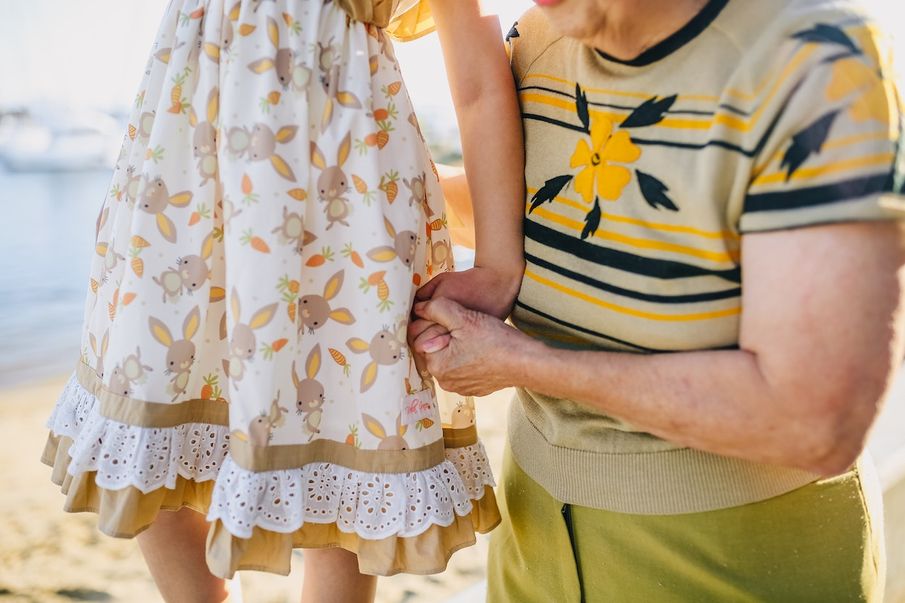Gemma Calvert speaks to author, podcaster, and Mother Pukka founder Anna Whitehouse on the emotional wrangle of ‘gran-nannying’, and why grandparents should not be papering the cracks of an underfunded childcare system...
Modern-day mums are part of a transitional generation. We’re fighting to keep a sense of our professional selves when the working world is not set up for us to win. Schools finish at 3.15pm while offices close at 6pm, and childcare and wraparound school care is extortionate, with UK parents paying the third-highest childcare costs in the world, according to the OECD.
From the end of maternity leave to the age of three when Early Years support currently kicks in, is a devastating juncture in a new mum’s life – the point when many women, unless they put up a good fight, either drop out or are pushed out of the workforce, unable to afford the second mortgage of under-funded childcare.
I’ve been there. It was 18 months after my youngest daughter Esme* was born that I returned to work as a freelance writer, and initially blew my entire earnings on nursery fees. With my husband Matt also working non-stop as a freelance journalist, I’d attempt to write while looking after Esme at home, which was a nightmare. Last minute commissions would come in, and I’d struggle to produce the copy. I could feel my career slipping away.
Seeing that wrangle, my parents Lucia and Chris, stepped in. They live in Oxfordshire, an hour and 45 minutes away from our home in London, and for two years my mum travelled up by train on a Tuesday morning to whisk Esme away until Friday.
I felt grateful, privileged, and lucky to have my parents’ support – some don’t have that luxury – but the set up was heartbreaking. I wanted to raise our daughter, but could only do so if I sacrificed my career, which I didn’t want to do, and handing her over every week, then the subsequent separation anxiety, was traumatic.
My emotions were equally tested when Esme returned. After almost a year, having become so attached to my mum, at night she would call for her grandmother and push me away. In those moments, the sorrow and guilt was unreal. I’d think, ‘Who am I to try and hold on to a career? What am I doing, thinking I deserve this? Be at home with your child, accept you’ve been broken by this system.’ But deep down, I knew I wouldn’t expect my daughter to one day do the same. I wanted to be the blueprint for her.
That horrific myth of ‘wanting it all’? I didn’t. I just desired what I’d been raised to believe could be mine: a successful career as a working parent – a dream I found was being blocked by maternity discrimination and unequal pay, with women still paid less on average than men. I thought, ‘If I don’t fight for my career, I’m ultimately not fighting for Esme’s.’ I was fighting for the bigger picture, and I couldn’t have done that without my parents.
According to Age UK, 40% of the nation’s 14 million grandparents over the age of 50 have provided regular childcare for their grandkids, and while this has its advantages – keeping grandparents busy and active, offering purpose, and encouraging quality time with grandkids – there are downsides, too. Being directly involved in discipline, and managing things like screen time, diminishes the simplicity of the grandparent-grandchild relationship, and can also cause friction with the parents.

As an example, I had a no-sugar-after-7pm rule, but my parents happily gave Esme chocolate after 7pm. Then I became the bad guy after I rang mum to reinforce this. Of course, parents are right to say, ‘These are our rules’ but when grandparents are providing childcare for no financial recompense, many feel forced to pipe down.
Fortunately, mum always took any feedback from me amazingly, but I didn’t do the same in return. One time she observed, ‘Does she need new shoes? Has she grown out of these ones?’ and I was mortified, thinking, ‘Why didn’t I notice that?’
Every woman wants her mother to see her in the best light, but her question made me feel secretly judged for taking my eye off the parenting ball.
Then there was my guilt over denying my parents the retirement they had originally planned. Mum gave up her job as a part-time administrator to help us with childcare, and it was lovely that they spent so much time with Esme, but such responsibility is a huge physical and mental strain after finishing that cycle of life. Unless properly managed, the expectation that a grandparent should provide on-tap childcare can quickly build resentment.
After a year, when my parents were no longer able to offer childcare, our financial situation had improved, and thanks to their help we had saved enough to pay for some daycare. Now Esme is nine and her sister is five, my parents are back to being grandparents in the traditional sense, which is lovely. We made it work, but it’s unacceptable that we had no choice but to try.
Set up a separate WhatsApp group. You’ll be able to distance yourself a little from the normal relationship you have with your parents by having message groups for specific purposes, allowing you to look purely at what’s right for the child in one.
Determine your path. The Church of England offers sessions for engaged couples to establish what they want to achieve from walking down the aisle. I wish we had taken a similar approach to our relationship with my parents to ask what kind of relationship they wanted with our daughter, and to establish mutually agreed boundaries from the start.
Create check-in points. Have a probation period for both parties to discuss early on how the set-up is working. Three months in, ask, ‘Is everyone happy?’ Remove emotion and answer honestly. Laying bare your parenting style, lifestyle, and everything you feel you’re failing at makes you feel vulnerable. Take a deep breath before any exchange around childcare, think ‘This isn’t about my parents or me, this is about what’s right for our child.’
Find a shared interest. Find something that unites you and your parents that isn’t the child. Mum and I both downloaded the CALM meditation app. Between us, our biggest gripe was that we didn’t talk about anything other than the logistical exchange of childcare. Having little shared avenues mean that, during conversation, your parent doesn’t feel they’re just a childcare mule.
The UK has the highest childcare costs in Europe, so we must look to our European counterparts where childcare is cheaper and considered infrastructure to see how to do things better, without needing grandparents to hold together the childcare ecosystem. Take Germany, for example, where childcare is capped between 70 and 150 euros. By not properly funding childcare, the government is effectively saying, ‘We don’t believe in equality. We don’t see it as a necessity. We see it as something to be strapped to female shoulders.’
While the spring budget recently announced that 30 hours of free childcare per week will be extended to cover from the end of parental leave until school age, this won’t come into play until 2024. However, whether this will remain a viable or positive step in the long-term is yet to be seen, given reports that the rates to be paid to nurseries won’t be enough to subsidise costs, and could lead to more closures in future – returning parents to the cycle of a lack of affordable or available childcare options.
It is of the utmost importance that the government commits to aiding parents returning to work with a system that ensures support is sustainable. The result would see more people in work, a stronger economy, and less of an emotional and financial burden on grandparents who are plugging the gaps of a system that isn’t working.
The set up took us back to when we were parents looking after Anna, and her sister Karen. We did the things that we did with them, like visiting the zoo, instilling values, and teaching manners. With two of us, it wasn’t as stressful as when you’re a working mum and a dad with several children.
Lots of our friends [were surprised we were] committing to the nights and, yes, it was tiring, but if I wanted an afternoon off to go swimming or to do pilates, Chris took over. We didn’t stop our lives and as grandparents, we were delighted to have that time.
Some grandparents get fed up of always being asked to help out with childcare, especially at short notice, but Anna and Matt never took advantage of us, and there was never any ill-feeling. Offering childcare was our decision, just as it was our decision when, after a year, Anna and Matt moved further away, and we felt we could no longer help out as much. Arrangements like this require total honesty.
I’m so glad we gave Anna our time, because in that year she started Mother Pukka. I’m so proud of what she’s achieving, and how she’s helping other working mums.
*Name changed
Anna Whitehouse is a successful author, presenter and founder of @motherpukka and @dirtymotherpukka.


Comments